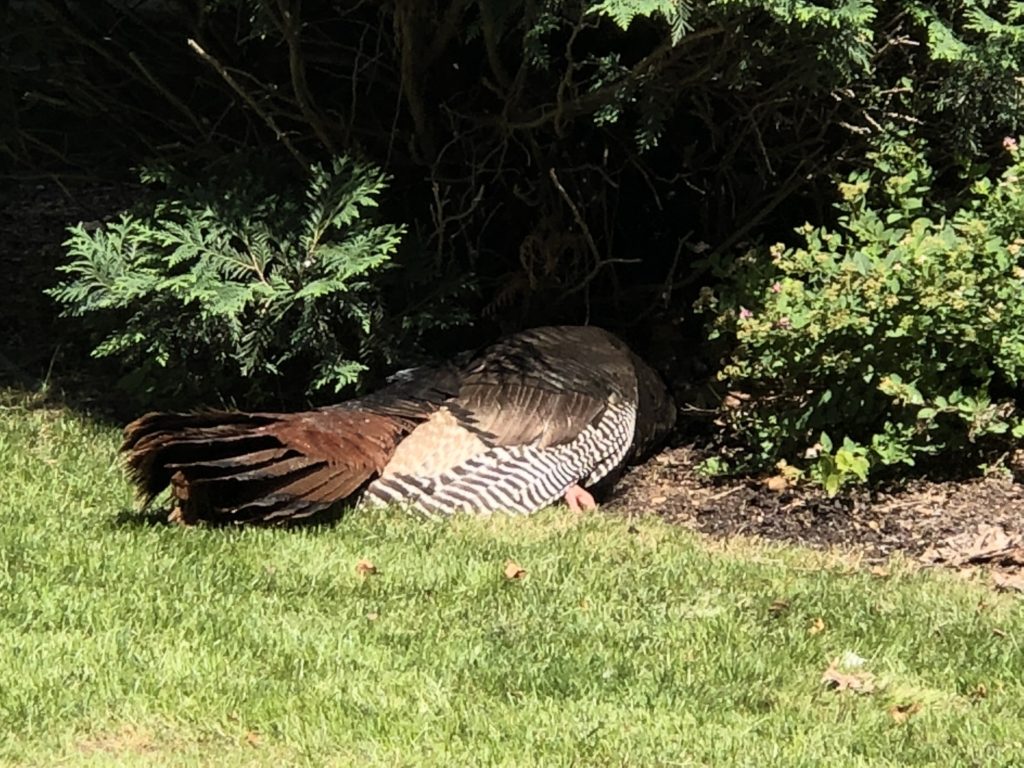A Dead Turkey
by Lydia Floren
I’ve never seen a dead turkey before.
Wait, I take that back. I’ve seen hundreds of dead turkeys. In the grocery freezer section, right before Thanksgiving.
But, I’ve never seen a dead turkey like this.
Sometime between morning chores and afternoon errands, this guy appeared on the edge of our lawn.
I walked up to him. halfway thinking he’d get up and run off.
Nope.
I made some noise, nudged him with my toe.
Nothing.
Then, I noticed the flies buzzing around.
Hmmmm. Maybe he wasn’t just sleeping.
I texted my husband.
I said, “I think we have a dead turkey in our front yard.” And then, “I’m not sure I’ve ever said that sentence before.”
I sent him a picture.
 Although I am not sure, in retrospect, why he would want a picture of a dead turkey on his phone. (Sort of like the time someone texted me a picture of their kid’s poop. There are some lines that just need to be drawn. And feces, and probably dead turkeys, are on the other side of those lines.)
Although I am not sure, in retrospect, why he would want a picture of a dead turkey on his phone. (Sort of like the time someone texted me a picture of their kid’s poop. There are some lines that just need to be drawn. And feces, and probably dead turkeys, are on the other side of those lines.)
I went off to run my errands, hoping, though not terribly optimistic, that the big bird would wake up and move along while I was gone. Not sure what I would do if he didn’t. Didn’t really want a rotting turkey on the lawn.
When I got to the beauty shop and told my hairdresser about it, she suggested calling animal control, although I wasn’t sure why they would want him. He wasn’t really a rabies risk. But maybe he had some strange disease that they were testing for.
When I got back home, the turkey was gone.
Wow.
Maybe he was just napping. And woke up and wandered off.
I walked in the house and found my husband, Andrew, on the back porch. He was leaning on the rail with his B.B. pistol. On the lookout for crows and bunnies. (They eat my flowers.)
“Did you see the turkey?”
“Yeah.”
“Did you do something with him?”
“Yeah.”
“What did you do?” (Surely he didn’t put him in the trash can. The trashmen didn’t come for another week.)
“I got a shovel, picked him up, and threw him over the back fence, down the hill.”
“Where?”
“Over by that big tree on the right, about halfway down. If you walk over that way, you can see him.”
“No thanks. I’m good.
Thank you very much for getting rid of him.
You are my hero.”
“I’d rather be your hero than your dead turkey.”
Do you have a dead turkey in your yard? A disappointment? A grudge? A sin you keep beating yourself up for? An offense, or wrong you need to apologize for? Don’t wait around for it to vanish on its own. Do something about it. Take a shovel. Pick it up. And throw it out, so its rotting flesh doesn’t stink up your life.
And then move on.




